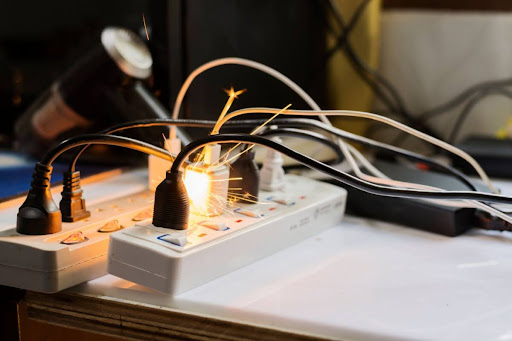Fires that start because of electrical issues happen more often than most people realize. These fires often start quietly and escalate quickly. Something as small as a worn wire or a single overheated switch can turn into a full-blown emergency.
At Grasser Electric, we believe in giving The Greater St. Louis Area real-world information on how to keep homes safer and more secure. That’s why we’re here laying out everything you need to know regarding electrical fires, including common causes and effective prevention methods. Plus, we’re always around when you need professional residential or commercial electrical services. From panel upgrades to electrical repairs and even emergency assistance, we’ve got you covered.
Now, let’s dive into the essentials of electrical fires so you can keep your property and your loved ones free from harm.
What Are Some Common Electrical Fire Causes?
Electrical fire risks show up in lots of everyday situations. Sometimes, these problems have been hiding behind walls for years. Other times, they’re caused by something simple, like plugging one too many things into a single outlet. Recognizing these fire hazards means staying ahead of them.
Overloaded Circuits
Think of your home’s electrical network like a system of roadways. An overloaded circuit is like a massive traffic jam — too much electric current is moving through a wire, causing it to heat up dangerously. This often happens when you plug too many high-power appliances into a single circuit.
Your circuit breaker is designed to trip and cut off the power in these situations, acting as a crucial safety mechanism. If you find a circuit breaker repeatedly tripping, it’s a clear signal that the circuit is under too much strain, creating a significant fire risk.
Faulty Outlets and Switches
You interact with outlets and switches every single day, but they can wear out over time. A loose connection where a plug meets an outlet can create a dangerous situation known as an electric arc, which generates intense heat. If you notice an outlet that’s warm to the touch, discolored, or makes a buzzing sound, these are warning signs of a serious electrical fault. The same goes for a light switch that feels hot or emits a strange odor; these are indicators that the internal wiring may be compromised and require immediate attention from a qualified electrician.
Outdated Wiring Systems
Older buildings often have wires that no longer meet today’s safety codes. These aging systems can’t handle the power demands of newer appliances and electronics. That gap leads to short circuits and overheated wires. Even if the wires seem fine on the surface, hidden issues inside the walls may still pose a hazard.
Misused Extension Cords
Extension cords become fire hazards when people use them as permanent wiring solutions or daisy-chain multiple cords together. These temporary power sources can overheat when carrying loads beyond their capacity, particularly when running high-demand appliances like space heaters or power tools. Damaged cords with exposed wires pose additional risks, as they can create short circuits.
Malfunctioning Appliances
The appliances that make our lives easier can also pose a threat if they are not functioning correctly. A frayed cord, a persistent burning odor, or an appliance that repeatedly blows a fuse are all red flags. Internal electrical faults can lead to overheating and ignition.
DIY Electrical Work
Improper electrical installations and repairs create hidden dangers that may not manifest for months or years. Amateur electrical work often involves incorrect wire connections, inadequate electrical cable ratings, or incorrect circuit breaker installations that compromise your entire electrical system. These mistakes can cause fires long after the work is completed, which is why a professional electrician is the safer choice for any electrical modifications.
Arc Faults and Ground Faults
Arc faults happen when wires touch in a way they shouldn’t. That contact creates an electric arc, which can ignite nearby materials. Ground faults occur when electricity leaves its intended path, often through water or metal surfaces. Both situations cause surges or shocks and might lead to house fires without warning.
Seasonal and Holiday Hazards
Holiday decorations and seasonal equipment introduce temporary fire risks into your home’s electrical network. Overloaded power strips supporting numerous light fixtures, damaged outdoor extension cords exposed to water and weather, or space heaters running continuously during cold months all create elevated fire hazards. These seasonal additions often push electrical systems beyond their safe operating limits.
Electrical Fire Prevention Checklist
Staying safe begins with small habits and simple checks. This list covers some smart steps people can take to reduce risk and keep their property safe from electrical fire hazards.
- Inspect Cords and Plugs Regularly: Take a quick look at the cords on your appliances and electronics for any signs of fraying or damage. A damaged electrical cable is a serious hazard and should be replaced immediately. Make sure plugs fit snugly into outlets to prevent a loose connection.
- Don’t Overload Outlets or a Power Strip: Avoid plugging too many devices into a single outlet or power strip. Distribute your high-power appliances among different circuits. A surge protector can offer some protection, but it won’t prevent an overload.
- Test Your Smoke Detector and Carbon Monoxide Alarms: A working smoke detector is your first line of defense in a fire emergency. Test your detectors monthly and replace the batteries at least once a year. It’s a simple step that can save lives.
- Be Mindful of Water and Electricity: Water is a conductor of electricity, and the combination can be lethal. Never use electronics near water, and make sure outlets in your kitchen, bathroom, and outdoors are protected by a Ground Fault Circuit Interrupter (GFCI).
- Give Appliances Proper Space: Appliances like your computer, television, and air conditioning unit need adequate space for ventilation. Overheating can occur if they are placed in enclosed areas without enough airflow, increasing the fire risk.
- Unplug Small Appliances When Not in Use: Toasters, coffee makers, and other small kitchen appliances can still pose a risk even when not turned on. Unplugging them when you’re finished using them is a simple habit that enhances safety.
How Professional Electrical Services Can Help
While your own efforts in promoting fire safety are valuable, certain tasks truly require a professional electrician’s expertise. Our team at Grasser Electric can perform a thorough electrical inspection, identifying issues like outdated wiring and faulty connections before they become a major hazard. A professional assessment provides a clear picture of your electrical network’s health and offers concrete solutions to any potential problems, ultimately giving you confidence in your home’s safety.
We also handle critical electrical repairs, replace or upgrade your entire electrical panel to meet modern demands, and can swap out old lighting and outlets that pose a hidden risk. Additionally, our electricians can install modern safety devices like AFCIs, GFCIs, a whole-house surge protector, and additional outlets to reduce reliance on an extension cord.
Call Now for More Electrical Safety Tips or to Book an Appointment!
Don’t wait until you smell smoke or notice warning signs to address electrical safety concerns in your home. Contact Grasser Electric today to schedule a comprehensive electrical inspection that identifies potential fire hazards before they become emergencies. Our experienced electricians provide honest assessments, practical solutions, and professional installation services that protect your family and property.

